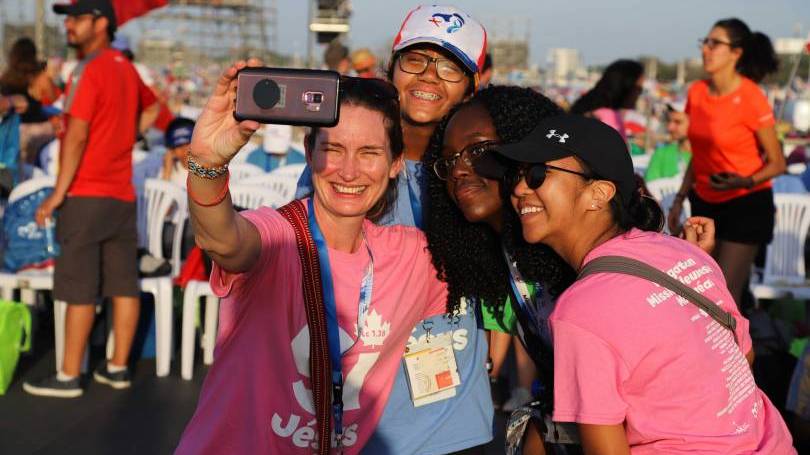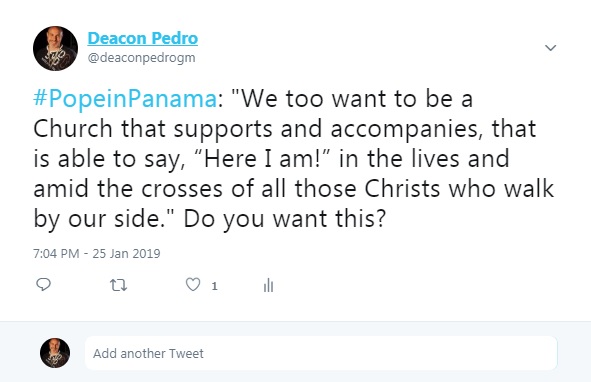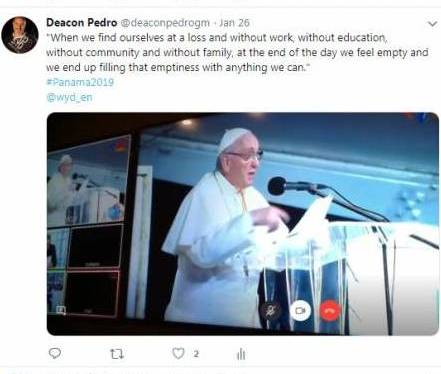Deacon-structing the Call - Lessons from Panama: Belong
Deacon Pedro
Sunday, February 24, 2019

Today, I’d like to look at the third and final lesson on vocations: Belong.
While dreaming and loving may seem fairly obvious ingredients to vocational discernment, belonging is probably not that obvious.But this is a recurring theme for Pope Francis.
On the Thursday morning, he told the Bishops of Central America:We should rejoice to see how the seed sown has not fallen on deaf ears. Many of (young people’s) concerns and insights took root in the family, encouraged by a grandmother or a catechist, or in the parish, in educational or youth programmes. They then grew through hearing the Gospel within lively and fervent faith communities that provided rich soil in which they could flourish.The Holy Father is saying that faith is born and nurtured in family and community. I would add that faith is born and nurtured in those very environments where we belong, precisely because we belong there. On the Friday morning, Pope Francis celebrated a Reconciliation Service with a group of young men in a detention centre. To them he said:
A society grows sick when it is unable to celebrate change in its sons and daughters. A community grows sick when it lives off relentless, negative and heartless complaining. But a society is fruitful when it is able to generate processes of inclusion and integration, of caring and trying to create opportunities and alternatives that can offer new possibilities to the young, to build a future through community, education and employment.Indeed those youth can only grow and flourish when communities integrate them. They can only do so when they belong.
 That night at the Way of the Cross he told us:
That night at the Way of the Cross he told us:
We too want to be a Church that supports and accompanies, that is able to say, “Here I am!” in the lives and amid the crosses of all those Christs who walk by our side. From Mary we learn how to say “yes” to the patience and perseverance of the many mothers, fathers and grandparents who never cease to support and accompany their children and grandchildren in trouble.Later on he then added:
Like Mary, we want to be a Church that fosters a culture that welcomes, protects, promotes and integrates; that does not stigmatize, much less indulge in a senseless and irresponsible condemnation of every immigrant as a threat to society… …We want to be a Church of memory, which appreciates and respects the elderly and gives them their rightful place.It’s true. Belonging is not just for young people. Everyone needs to know that they belong. I am reminded of a beautiful phrase I heard once that, “everyone has a right to know that they are loved.” I would add that we all have a right to belong and to know that we belong.
This is directly related to our ability to dream and to love.
One of the pope’s quotes from WYD 2019 that is being most shared was when he spoke about how God has no “meantime”. This was at the Final Mass. He said:You, dear young people, are not the future but the now of God. He invites you and calls you in your communities and cities to go out and find your grandparents, your elders; to stand up and with them to speak out and realize the dream that the Lord has dreamed for you.
 When my children were younger, I was always intrigued at how much they enjoyed watching home movies. When my first son was born, I went out and bought a used VHS camcorder. I am so glad I did. That camera gave us hours and hours of footage of the mundane of our lives. As my kids grew older, it provided them with a sense of who they were and where they came from. It gave them a sense of home and belonging.
That sense of belonging is what gives us confidence in who we are and allows us to trust in our instincts and desires. Belonging gives us the security that we need in order to “go for it” and make mistakes. It is what allows us to “go make a mess” and stand up for our beliefs. Again, it goes hand in hand with being unconditionally loved, and in turn, that allows us to trust and pursue our dreams.
It is no coincidence that Jesus didn’t leave a group of 11 individuals; he left us a Church. It is no coincidence that we are called to be Church, to be a body.
When my children were younger, I was always intrigued at how much they enjoyed watching home movies. When my first son was born, I went out and bought a used VHS camcorder. I am so glad I did. That camera gave us hours and hours of footage of the mundane of our lives. As my kids grew older, it provided them with a sense of who they were and where they came from. It gave them a sense of home and belonging.
That sense of belonging is what gives us confidence in who we are and allows us to trust in our instincts and desires. Belonging gives us the security that we need in order to “go for it” and make mistakes. It is what allows us to “go make a mess” and stand up for our beliefs. Again, it goes hand in hand with being unconditionally loved, and in turn, that allows us to trust and pursue our dreams.
It is no coincidence that Jesus didn’t leave a group of 11 individuals; he left us a Church. It is no coincidence that we are called to be Church, to be a body.
In that body, we all have a place; we all belong.
Pope Francis’ last stop before leaving Panama was at the Good Samaritan Home for HIV Patients. To them he spoke about home:To create a “home” is to create a family. It is to learn to feel connected to others by more than the utilitarian and practical bonds that make us feel that our life is a bit more human. To create a home is to let prophecy take flesh and make our hours and days less cold, indifferent and anonymous. It is to create bonds by simple, everyday acts that all of us can do. A home –and this we all know very well – demands that everyone work together. No one can be indifferent or aloof, since each is a stone needed to build the home. And that also means asking the Lord to grant us the grace to learn to be patient, to forgive one another, to start over each day. How many times should I forgive and start over? Seventy times seven times, as many times as necessary. To create strong bonds requires confidence and trust nurtured daily by patience and forgiveness. That is how the miracle takes place: we feel that here we are reborn, here we are all reborn, because we feel God’s caress that enables us to dream of a more human world, and therefore of a world more divine.Indeed, for those who have been marginalized and rejected, once they are integrated, once they belong, once they have a home, they are able to be reborn. I think many of us can think of young people who have lost their drive, who are out of touch with their desires. They are not motivated and seem to be caught in a revolving door. For them the very notion of vocation or that God has a place and a call for them is so foreign. They have lost their ability to dream. They are not able to truly love. They do not feel like they belong anywhere. This past summer I spent some time with a friend who works with young people with severe disabilities in Argentina. He told me that the basis of his therapy with these students is to give them a home. Once they have a sense of home, of belonging, the rest of the work almost always falls into place. Interesting. That one comment left me thinking for days. Hearing Pope Francis speaking in Panama helped me make the connection: We all need a home. It gives us a sense of who we are. That is why God is "Father". That is why Jesus was born into a family. It also explains why God is Trinity:
God is relationship. God is family. God is home.
Perhaps these three lessons can be a guiding light for those trying to help young people who are searching. Academic approaches to vocational discernment will never beat a loving community where one belongs and where one is allowed to dream. Every week, Deacon Pedro takes a particular topic apart, not so much to explore or explain the subject to its fullness, but rather to provide insights that will deepen our understanding of the subject. And don’t worry, at the end of the day he always puts the pieces back together. There are no limits to deaconstructing: Write to him and ask any questions about the faith or Church teaching: pedro@saltandlighttv.org
Every week, Deacon Pedro takes a particular topic apart, not so much to explore or explain the subject to its fullness, but rather to provide insights that will deepen our understanding of the subject. And don’t worry, at the end of the day he always puts the pieces back together. There are no limits to deaconstructing: Write to him and ask any questions about the faith or Church teaching: pedro@saltandlighttv.orgRelated Articles:
Category: Saints and Blesseds, St. André Bessette
Tag: André, André Bessette, Brother Andre, Canonization, Congregation of Holy Cross, Mary Rose Bacani, Pope Benedict XVI, Saints, St. Joseph's Oratory
Pope’s General Audience – February 5, 2025
Wednesday, February 5, 2025
 Pope Francis
Pope Francis
In his Wednesday General Audience, Pope Francis continued this cycle of catechesis on "Jesus Christ our Hope," as part of the Jubilee 2025. This week he reflected on the Magnificat, the Virgin Mary's Song of Praise after she is greeted by her cousin Elizabeth.
Pope’s General Audience – January 29, 2025
Wednesday, January 29, 2025
 Pope Francis
Pope Francis
Reflecting on the vision given to St. Joseph in the Gospel of Matthew, Pope Francis said that "He dreams of the miracle that God fulfils in Mary’s life, and also the miracle that he works in his own life: to take on a fatherhood capable of guarding, protecting, and passing on a material and spiritual inheritance."
Pope’s General Audience – January 22, 2025
Wednesday, January 22, 2025
 Pope Francis
Pope Francis
Pope Francis continued this cycle of catechesis on "Jesus Christ our Hope." Reflecting on the Angel Gabriel's greeting to the Virgin Mary at the Annunciation, he said that "The 'Almighty,' the God of the 'impossible' is with Mary, together with and beside her; He is her companion, her principal ally, the eternal 'I-with-you.'"
Pope’s General Audience – November 27, 2024
Wednesday, November 27, 2024
 Pope Francis
Pope Francis
In his weekly catechesis, Pope Francis reflected on the fruits of the Spirit. Beginning with Joy, he said that "not only is it not subject to the inevitable wear of time, but it multiplies when it is shared with others! A true joy is shared with others; it even spreads."
Pope’s General Audience – November 13, 2024
Wednesday, November 13, 2024
 Pope Francis
Pope Francis
In his weekly catechesis, Pope Francis reflected on how the Holy Spirit empowered the Blessed Virgin Mary to become the Mother of God.













